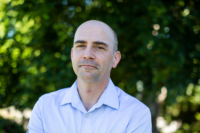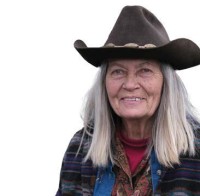People Power
Defeating the Port Westward Fracked Gas-to-Methanol Refinery

I grew up outside of Oregon City where my parents raised sheep, a project that often involved the whole family. I enjoyed the work of shearing, herding, trimming hooves, and raising lambs. Although this wasn’t our primary source of income, I gained an appreciation for the challenges and dedicated work involved in farming. It also inspired me to work with farmers fighting to protect their livelihoods and our climate from fossil fuel development. Imagining a pipeline cutting through my parents’ pasture, or a refinery hovering above their home and polluting local waterways, I could relate at least a little bit to the tenacity with which farmers have stared down so many fossil fuel proposals.
This year, we teamed with farmers and community members in the Columbia River estuary to celebrate another epic victory against the fossil fuel industry. The proposed fracked gas-to-methanol refinery at Port Westward, near Clatskanie, OR, bit the dust, a sprawling facility that would have been one of the largest fracked gas-to-methanol refineries in the world.
Beginning in 2014, Northwest Innovation Works (NWIW) proposed three massive fracked gas-to-methanol refineries in the Pacific Northwest. Community opposition stopped each one—first in Tacoma in 2016, then in Kalama in 2021, and finally at Port Westward in 2022—a clean sweep of rejection for projects that would have emitted huge amounts of climate-changing pollution each year. The defeat of NWIW’s proposals marks a huge victory for tireless local advocates and a broad regional coalition opposed to new climate-wrecking fracked gas projects.
Inspired by the incredible farmers who continue to fight for their Port Westward community, I penned a short “how-to” manual for defeating fracked gas infrastructure. The people at Port Westward and throughout the Columbia River have battled some of the biggest dirty energy projects in the region, interrupting their busy lives caring for mint farms, blueberry fields, and farmers markets to stand up for productive soil, clean water, and a healthy community. They stopped dirty energy projects more frequently than I sheared sheep. Even now, the farmers continue to push back on a new non-conventional diesel refinery, a major threat to their water and livelihoods, and we continue to stand with them in that effort.
Local advocates’ deep connection to land, water, and community enables the grinding effort of protecting these areas to continue. The joy and beauty people share with one another along the way— offering food, telling stories, sharing work, and building inspiration for a sustainable farming future for their community—demonstrates why these communities are worth fighting for.

The people at Port Westward have battled some of the biggest dirty energy projects in the region, standing up for productive soil, clean water, and a healthy community.
How-To Victory Manual
Step 1: Understand the project. We worked together to pry open company communications and regulatory documents, we learned that the methanol proposals on the Columbia were massive, demanding huge quantities of fracked gas, power, and water. Demystifying the project was a community effort, with local residents often leading research on their own.
Step 2: Share knowledge, coordinate action. The Port Westward area is rural and diverse, with a monastery, farms, and residents very close to the area where the methanol refinery was proposed. For years, local residents and farmers worked to educate and empower their community in diverse ways—raising funds for legal appeals, conducting research, giving presentations, hosting outdoor events, and publishing mailers that educated people about why Port Westward deserves protection.
Step 3: Stand in solidarity. By having a long engagement in resisting liquified natural gas, coal, oil, and other fossil fuel schemes at Port Westward, people in the community grew to know one another and foster connections with others in the Lower Columbia who had faced similar challenges. Having fought together before, we had a stronger foundation for standing up to the methanol refinery. We learned and shared knowledge with others. Often testifying together in support of one another, our strategy and action made a big difference. Spanning years, community solidarity amplified the efforts of each small community, including Port Westward and Kalama.
You power Columbia Riverkeeper’s vital work for clean water and our climate.


